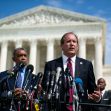Late last week, Florida became the first state to regulate online content moderation by tech firms such as Google, Facebook, and Twitter. Governor Ron DeSantis signed a piece of legislation that allows for legal action against social media companies that “de-platform” political candidates on their sites.
The Stop Social Media Censorship Act could fine social media giants up to $250,000 for every day that a statewide political candidate is banned or suspended from a platform. It also allows for up to $25,000 a day for any other candidate removed from any social media platform, regardless of the content of their posts.
The Act also limits the ability for social media giants to moderate the content posted by their users and requires these platforms to set up due process rights for users. Social media platforms must give detailed information on why the content was taken down. It allows users to opt out of any algorithm created by the platform, allowing users to opt into a solely chronological newsfeed.
Many see this as a way for Floridians to release their anger over social media platforms banning President Trump after the January 6th U.S Capitol Riots. Michael Froomkin, a professor of internet law at the University of Miami, told Wired in an interview that “this is obviously unconstitutional, you wouldn’t even put it on an exam.”
Under the First Amendment of the U.S. Constitution, companies or entities are not obliged or forced to publish or broadcast an individual or other entities’ speech. Opposition to Florida’s new law sees this as a “must-carry provision” if those entities are prohibited from “de-platforming” political candidates.
Section 230 of the Communications Decency Act (CDA) generally gives online platforms like Facebook and Twitter immunity from liability from the type of content their users post. Additionally, under the Act, platforms are free “to restrict access to or availability of material” as long as they do so in good faith. This section of the CDA also preempts any state law that conflicts with it, making this new Florida law almost impossible to enforce and an expensive exercise solely at the taxpayer’s cost.
Over the past year, Congress has debated how to, and if they should, amend this section of the Act. Democrats have argued that platforms don’t go far enough in restricting misinformation or violent content, while Republicans argue the opposite and that conservatives are usually more censored than liberals.
While still in his presidency, Donald Trump filed a “declaration of domicile” officially making Palm Beach, Florida, his permanent residence. He stated a reason for the move was because he has “been treated very badly by the political leaders of both the [New York] city and state. Few have been treated worse,” indicating he would receive far better political treatment in Florida. Other than politics, Florida also does not have a state income tax or inheritance tax, an attractive option for an individual long criticized for not releasing his tax documents to the public.
Following the January 6, 2021, Capitol riots, Donald Trump was permanently suspended from Twitter “due to the risk of further incitement of violence.” He was also indefinitely blocked from Facebook, banned from Snapchat, and Reddit banned the channel r/Donald Trump. In addition to Trump, Sidney Powell, Steve Bannon, and Michael Flynn also were banned from various social media accounts for their support of either the Capitol riots or other uses of violence to suppress opposition.
Governor DeSantis is regarded as a “rising star” in the Trump era of the GOP. He likely has his eyes set on a run for President, should Donald Trump not run in 2024. DeSantis has long been against “Big Tech” and stated that “We took action to ensure that ‘We the People,’ real Floridians across the Sunshine State, are guaranteed protection against the Silicon Valley elites.”






